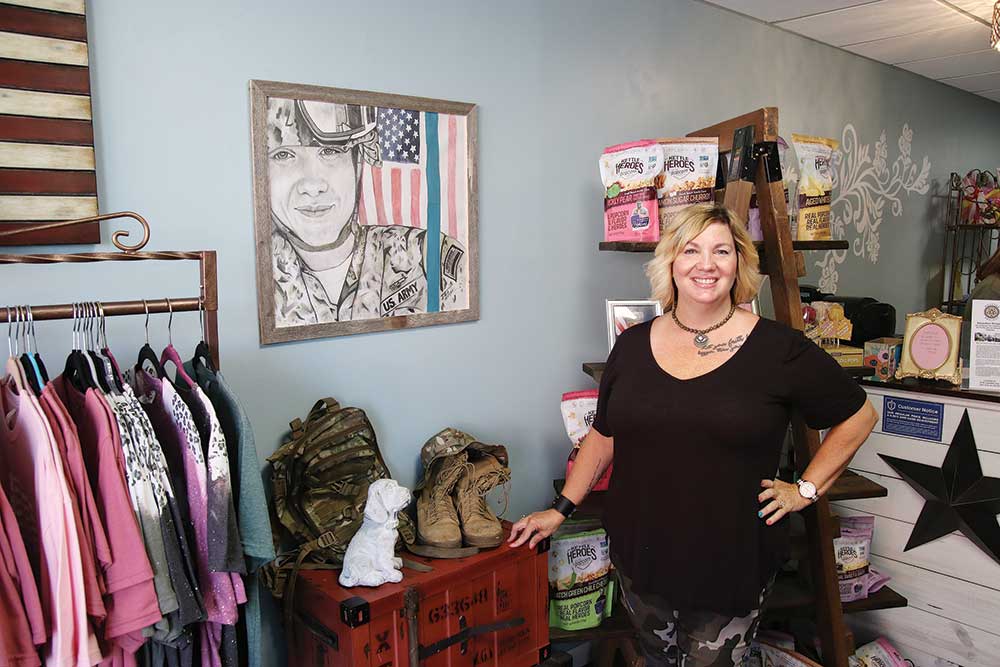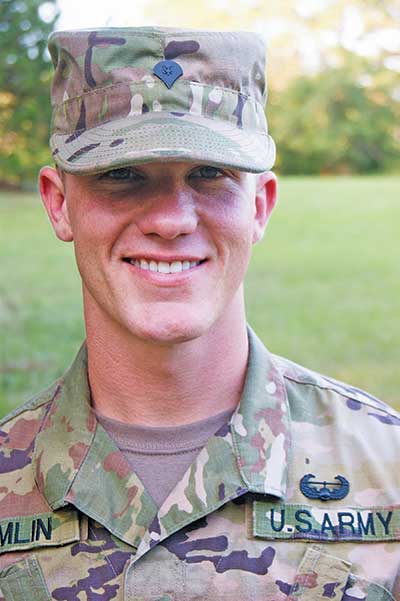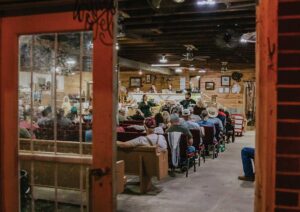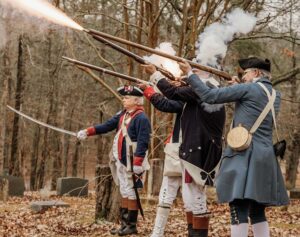
Helping area veterans and honoring a military son’s memory
Story Paul South
Photos by Graham Hadley
Submitted photos
Even as a kid, Houston Lee Tumlin “lit up a room” when he entered. The moviegoing public saw his light in the movie, Talladega Nights: The Ballad of Ricky Bobby, where Tumlin played Walker Bobby, the oldest son of Ricky, played by Will Ferrell.
He played the part to the hilt, his mom, Michelle, remembered. But when the cameras stopped rolling, the then-13-year-old went back to his St. Clair County raising.
“They would be filming, and he would just be cussing people out. But when they would go to break, he would say, ‘May I have a bag of chips?’”
The astonished cast and crew wondered where the on-camera kid with potty mouth had gone. “They were all wondering where those manners came from,” Michelle says.

But that was Houston, a class clown and sometimes “hot mess” who loved to make people laugh, who would defend bullied classmates, and competed in sports at Victory Christian Academy, especially football.
Competition began for him as a toddler — baseball, soccer, wrestling, even dabbling in mixed martial arts.
After high school, he joined the Army, earning medals and commendations and numerous training certifications, serving stateside and in South Korea in the storied 101st Airborne, based at Fort Campbell, Ky.
Among his honors: the Army Commendation Medal, the Army Achievement Medal, the Army Good Conduct Medal and the Non-Commissioned Officer Professional Development Medal and many others.
“He was a badass,” his mom says with a laugh.
But in his last military posting, life took a tragic turn for Houston Tumlin.
“The year in Korea was not good for him,” Michelle Tumlin says. “There was a lot of bad stuff that happened. “
But on March 23, 2021, the light turned to the deepest darkness. Suffering from PTSD (post-traumatic stress disorder) and what researchers at Boston University later determined was CTE (Chronic Traumatic Encephalopathy), Houston took his own life. For Michelle Tumlin, “It was the worst day of my life. The thing that I hold onto is that the doctors said to me that the CTE took away his impulse control. He had an on-off switch, and his flipped that day.
“You add the brain damage and some personal stuff and then you add the bad stuff that happened in Korea, and it was literally the reason he got out of the military.”
Daily, 22 past or present American service personnel commit suicide, their brains shaken by the blasts of battlefields, souls shredded by nightmarish memories, or concussions caused in competition. In Tumlin’s case, between sports and military service and two car accidents, he suffered an estimated 22 concussions between the ages of 14 and 28, Michelle Tumlin says. Those injuries triggered personality changes, alcoholism and changed Houston. His light was gradually fading to black. Depression, alcoholism, multiple head trauma: the recipe for CTE.
“He suffered the last four years of his life,” she says. “It was confirmed after a brain study at Boston University that he had CTE.” Among other contributing factors, “That’s the reason he committed suicide.”
CTE triggered his symptoms – headaches, happy one minute, sad the next, anger from out of nowhere and a descent into becoming what his mom called, “a straight-up alcoholic.”
“When he was drinking beer with a group of friends, he was fine. When he drank liquor, he would turn into the saddest, most depressed person who never thought he was good. He became a completely different person. That had a huge impact on him doing what he did. It was his kryptonite.”
The Tumlins are one of a growing number of military and NFL families that have donated their loved one’s brain for research at BU. CTE can only be determined after death.
While the Tumlin family’s grief will never die, a year to the day after Houston’s death, Michelle opened the nonprofit Houston Project. Proceeds from the sale of patriotic hats, T-shirts, popcorn, candles and “a little bit of everything” at the store go to help vets and their families. Every cent goes to veterans and their families.
In the Cogswell Avenue storefront, Michelle Tumlin fights a quiet battle. Armed with smiles and encouragement, she wants to give veterans hope.
“I started Houston Project because I needed something in my life that felt good, but to also raise awareness for mental problems, PTSD, alcoholism, CTE – all of the above – mental health, period. Raising awareness was important to me.”
She adds, “I wanted to do both of those things and honor my son.”
While the focus of the project is on veterans, the Houston Project is working with other area organizations to help in the fight against mental illness.
“Mental health is important, whether you are a veteran or not,” Tumlin says. “My platform is to be my son’s voice here on this earth. I’m here to tell his story and to try to keep others from doing what Houston did and help give them awareness before it gets to that. That’s why I exist.”
In other times in other wars, PTSD went by other names: shell shock, soldier’s complaint, combat fatigue or war neurosis. The historical record dates such illness as early as 2,600 years ago. And while researchers and medical professionals know more about PTSD, Tumlin believes veterans aren’t receiving adequate help.
“When (service personnel) get out of the military, they need a way to get back to who they were before they joined the military,” Tumlin says. “The military teaches them to be strong and to be tough and to be soldiers. It was hard for Houston to feel normal again. Not being in the military, he just didn’t feel right, if that makes sense.He couldn’t find his way.”
Houston missed the camaraderie of the military.
“He struggled with depression, nonstop. He was a happy person and a funny person. But he couldn’t find his right place.”
While Army Specialist E-4 Houston Lee Tumlin is gone, he is far from forgotten. While at the time of his death, sordid celebrity news outlets centered on the “Child Actor Commits Suicide” angle, so many others – in Pell City, in the Army and elsewhere – remembered him as so much more – son, brother, fiancé, a soldier who served his country with honor.
Houston Tumlin packed a lot of living into 28 years.
“He walked into a room and took it over. He had the most beautiful smile. He could make people laugh. I mean, the people that started reaching out to us after he passed – from all of these soldiers from all over the map – messaging us, calling us, telling us it was his goal to make people happy,” Michelle says.
There is another story that the Tumlins heard about their son, from a girl recounting the story of a date she had with Houston in the cold of winter.
“She said they were driving in downtown Birmingham,” Michelle recalls. “Houston stopped the car and told her he’d be right back. He got a coat from the back of the car, locked the car, and took the coat to a homeless man across the street. Hearing these stories just filled my heart. I could not be a prouder Mom.”
The Houston Project, created by a grieving family to help veterans and to honor their fallen son, not only helps vets with things like household repairs and moving expenses. It recently helped a veteran’s family in a poignant, particular way, a fitting tribute to the kid who lit up a room.
It paid the family’s utility bill and kept the lights glowing.
Editor’s Note: The nonprofit Houston Project is open Thursdays and Fridays from 11 a.m. until 5 p.m. The store is located at 1916 Cogswell Ave. in Pell City. Find the store on Facebook. Every cent of sales goes to help local veterans and their families.
















